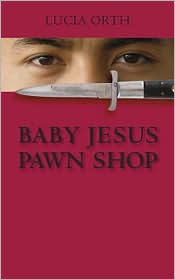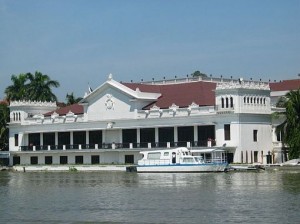“In the orphanages and on the streets, they sold children. In the brothels they sold love. In the market outside the church, they sold health, life, charms to ward off sickness, multi-colored holy waters and amulets for protection. In the churches they sold forgiveness and redemption, the promise of a new order in a new world. In Manila…you could buy anything.”
 In this extraordinary debut novel, author Lucia Orth uses the five years she worked for a non-profit organization in Manila to provide information, background, sensitive description, and color, however dark, about life in Manila for all levels of society. With an eye for the “unbelievable” and an ear for the absurd, she recreates Manila society in the early 1980s, the last years of the reign of Ferdinand and Imelda Marcos. Focusing on Trace Caldwell and his wife Rue, Americans working for US National Security interests in the Philippines during the Reagan years, the author uses a microscope, one with no “politically correct lens,” to examine US policy regarding this third world country.
In this extraordinary debut novel, author Lucia Orth uses the five years she worked for a non-profit organization in Manila to provide information, background, sensitive description, and color, however dark, about life in Manila for all levels of society. With an eye for the “unbelievable” and an ear for the absurd, she recreates Manila society in the early 1980s, the last years of the reign of Ferdinand and Imelda Marcos. Focusing on Trace Caldwell and his wife Rue, Americans working for US National Security interests in the Philippines during the Reagan years, the author uses a microscope, one with no “politically correct lens,” to examine US policy regarding this third world country.
For years the atrocities committed by the Marcos regime in the name of “democracy” were supported by the US. Many of the abuses had been “excused” because of the need to maintain US bases in the Philippines, necessary to the balance of power in this critical area during the Cold War. Orth, however, shows how the US policy at this time went against the true democratic ideals of both countries, creating impossible situations in which some Americans, such as Rue Caldwell, wife of Trace Caldwell, a “counterinsurgency specialist,” were helpless to act in any positive way, having few, if any, options to promote democratic ideals because of the importance of the bases.

As the novel opens, in June 1982, Ferdinand Marcos has been in power since his democratic election in 1965. For the past ten years, however, he has been a dictator, a sick man suffering from kidney failure, with an ambitious wife, who has emerged from poverty to protect his (and really, her own) interests, and a ruthless military which profits financially from keeping Marcos in power. The needs of the populace, most of whom are living in poverty, are disregarded, and no one really cares whether or not their needs are addressed. In the meantime, Benigno “Ninoy” Aquino, a potential rival for President, who does care about them, is living in exile in Boston, after enduring seven years, seven months, of solitary confinement in one of Marcos’s “re-education” camps.
Orth creates a vivid picture of Filipino life by focusing, in part, on the lives of the Caldwells and their servants. The Caldwells have rented their house from Baby and Raymonde de Varcegno, who have provided it, “equipped,” with Celia, the cook, and Doming Aguinaldo, the chauffeur, an educated young man who had been planning to enter the seminary before circumstances demanded that he help his family financially instead. Doming is using a false name for his own protection, and when he meets, and is eventually attracted to, Rue Caldwell, he emphasizes that he can trust no one and that neither can she. Her own husband and the US government are part of the problem. As he watches over her, the two are gradually attracted, and this growing emphasis on human feelings becomes as important to Orth as her depiction of the abuses of humanity which the Marcos regime represents.
 In setting up the action, Orth spends the first hundred or more pages slowly describing the country–with its starving zoo animals, its poor people scavenging in the dumps for food, the purchase and sale of babies, the deliberate crippling of young children to make them more effective beggars, the outrageous bribes that are necessary, the wanton appropriation of land and property by the administration at the expense of the poor who have only their land as assets, and the arrest and torture of anyone who even suggests an alternate way of thinking. At times the reader may become impatient for the action to begin, but when it finally does, it moves like lightning. And as the desperate populace, many of whom are now revolutionaries, tries to avoid being caught by all the spies, including children, who get rewarded for reporting on their neighbors to the police, a massive underground movement, with weapons and tactical plans for overcoming the Marcos regime takes root, with Ninoy Aquino as its center. Gradually, as Rue allows herself to love the people around her, including Doming, she becomes a more “human” character.
In setting up the action, Orth spends the first hundred or more pages slowly describing the country–with its starving zoo animals, its poor people scavenging in the dumps for food, the purchase and sale of babies, the deliberate crippling of young children to make them more effective beggars, the outrageous bribes that are necessary, the wanton appropriation of land and property by the administration at the expense of the poor who have only their land as assets, and the arrest and torture of anyone who even suggests an alternate way of thinking. At times the reader may become impatient for the action to begin, but when it finally does, it moves like lightning. And as the desperate populace, many of whom are now revolutionaries, tries to avoid being caught by all the spies, including children, who get rewarded for reporting on their neighbors to the police, a massive underground movement, with weapons and tactical plans for overcoming the Marcos regime takes root, with Ninoy Aquino as its center. Gradually, as Rue allows herself to love the people around her, including Doming, she becomes a more “human” character.

Orth has created a sensitive and powerful picture of life in the early 1980s in Manila, with all its problems, and she does so without sacrificing her story for politics. Rue Caldwell slowly develops the reader’s empathy, despite her naivete and inaction, and as she develops relationships with those “beneath” her, she becomes more representative of America’s real values. Orth has created a memorable and insightful story about a shameful alliance in American history between the US government and Ferdinand Marcos (who had been a pariah among all other countries), and her novel exposes the abuses of both governments. Dramatic, thoughtful, and memorable, this novel is on my Favorites List for 2010.
Notes: The author’s photo and bio are on her website: http://luciaorth.com
The photo of Malacanang, the Presidential Palace, on the Pasig River, “the most polluted river in the world,” appears here: www.pinoyexchange.com.
The interior, showing the elaborate decor of the Marcos administration, is here: www.philsite.net
At one point in the novel, Rue mentions that the song of the New People’s Army, “Bayan Ko,” which has since become an informal national anthem, is the most beautiful melody she has ever heard. A London boys’ choir named Libera surprised the Philippines International Convention Center with a performance of this song in September, 2009, bringing down the house: www.youtube.com (truly a “chicken skin” moment).
The song “Bayan Ko” was also sung by Lea Salonga at the August 1, 2009, funeral of Corazon Aquino, the widow of Ninoy Aquino. (She was the successor to Marcos after her husband, living in exile, was assassinated before he could set foot on Philippine soil.) The jumpiness of the video disappears after the beginning:
